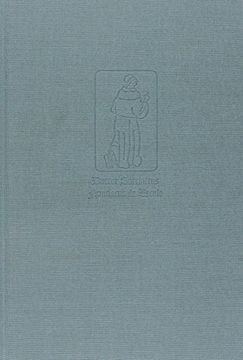Compartir
Francisci de Marchia―Quaestiones in Secundum Librum Sententiarum (Reportatio): Quaestiones 28–49 (Ancient and Medieval Philosophy, Series 3) (en Inglés)
Tiziana Suarez-Nani; D Duba; W Carron; G-J Etzkorn (Autor)
·
Leuven University Press
· Tapa Dura
Francisci de Marchia―Quaestiones in Secundum Librum Sententiarum (Reportatio): Quaestiones 28–49 (Ancient and Medieval Philosophy, Series 3) (en Inglés) - Tiziana Suarez-Nani; D Duba; W Carron; G-J Etzkorn
$ 60.95
$ 101.59
Ahorras: $ 40.64
Elige la lista en la que quieres agregar tu producto o crea una nueva lista
✓ Producto agregado correctamente a la lista de deseos.
Ir a Mis Listas
Origen: Reino Unido
(Costos de importación incluídos en el precio)
Se enviará desde nuestra bodega entre el
Miércoles 24 de Julio y el
Viernes 02 de Agosto.
Lo recibirás en cualquier lugar de Estados Unidos entre 1 y 3 días hábiles luego del envío.
Reseña del libro "Francisci de Marchia―Quaestiones in Secundum Librum Sententiarum (Reportatio): Quaestiones 28–49 (Ancient and Medieval Philosophy, Series 3) (en Inglés)"
In English and LatinIn the questions contained in this volume, Francis of Marchia explores subjects that earned him his fame in the Middle Ages and in the history of ideas: physics and philosophical psychology. He confronts the key issues in celestial physics, concluding with his well-known proofs for terrestrial and celestial beings having the same type of matter. Marchia's discussion of how elemental qualities persist in mixtures leads to a spirited and unique defense of a mind-body dualism: not even the sensory faculties are coextensive with the body. Moreover, each living being has two forms: the soul and the form of the body (q. 38). Marchia rejects the Averroistic doctrine of the unicity of the intellect, as well as acts of understanding being entirely the result of external stimuli. Those positions in turn inform his investigation of the mechanics of thinking and willing, and his establishment of the wills priority over the intellect. Finally, Marchia balances human free will with Gods absolute power and cooperation in all matters.Throughout these questions, Marchia shows his originality and sharp intellect. Although at times his solutions look similar to those of John Duns Scotus, they are in fact very different, reflecting Marchias awareness of the problems and limitations involved in not only Scotus views, but also those of Aristotle and Averroes, Thomas Aquinas, and Henry of Ghent, among many others.

